“Shimon Hatzadik (the righteous) said, ‘The world depends on three things to stand: Torah, connecting with something bigger than ourselves, and acts of lovingkindness’” (Pirkei Avot 1:1-2). Our Learners spent a day unpacking each of these elements, how the world depends on them, and how we can do them.
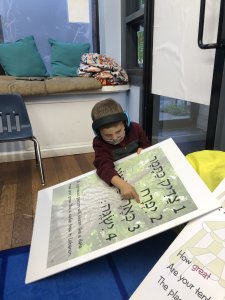
The Garinim (kindergartners) explored acts of lovingkindness with a favorite book of ours, Have You Filled a Bucket Today? The book invites us to imagine that everyone is carrying around an invisible bucket. The bucket holds “things that we love, joy, kindness, and good feelings about ourselves” as one of our learners put it. Everyone has the opportunity to help fill each other’s buckets (and our own bucket too!) or to dip into each other’s buckets with our words and actions throughout the day.
Here are some of the bucket-filling choices the Garinim notice themselves doing every day:
- Smile!
- Love people.
- Give hugs.
- Make a card for someone.
- Talk to someone who is sad.
- Encourage other people – cheerlead for them.
- Make someone laugh.
- Give presents.
- Share my toys.
- Behave well in school (to help fill my teacher’s bucket).
- Share my lunch if someone is missing theirs (before COVID anyway).
- Have a good day at school.
- Having my favorite foods.
What an excellent bunch of bucket-fillers! After brainstorming this list, the kiddos were all excited to go inside and create their own buckets. We noticed that the buckets in the book each looked a little bit like the person who was holding it. Everyone got a chance to craft a paper bucket for themselves with their personal flair – eyes or hair that looked like theirs, jewelry and a tiara, arms reaching out for a hug. At the end of the day, the last few kids in the class sat together writing and drawing kind, loving notes to fill each other’s buckets with.
On Thursday we zoomed out to look at this quote from Shimon Hatzadik as a whole. We contemplated why he decided the world depends on these particular three things to stand, and we came up with our own list of the three most important things to the world. Here are some of the things we think the world depends on:
- Torah!
- Stars – because without them out space wouldn’t be as cool and it would be all dark around the earth.
- Love – because without it people would just destroy the whole world.
- Sharing – so that people can get the toys and everything they need.
- Helping – because without it people would just get hurt and not get better.
- Food and water – without them we would die.
- Love – because if there were no love, then everyone would be sad, and no one would help because no one would care to help and also because everyone would be too sad.
- Sunlight – so we don’t bump into things.
- Love to spread if you’re feeling sad.
One kindergartner noticed that almost everyone’s list had love on it for some reason or another (including Shimon Hatzadik!) and speculated that maybe that’s single most important thing the whole world depends on to stand and maybe we don’t even need anything else.
The Shorashim (1st, 2nd, and 3rd Graders) started their week with a discussion about what we think of when we hear the word, “Torah”:
- A giant scroll
- Hebrew words with a fancy cover
- Jewish people reading
- A joke where “Torah” is the answer (making such riddles was one of the Shulchanot Avodah activities)
- The Tree of Life
- “A holy Jewish tool to read and sing prayers that we read with respect”
We then discussed the passage where Moshe received the Torah and then it is transmitted through a long lineage of people, considering why it would go through the elders first before the Bnei Yisrael . We considered the elders in our life (whether an older sibling or a grandparent), and what kinds of things we might tell them before we tell others. We considered what kids can learn from their elders and also what elders can learn from kids.
Some examples that came up:
- Video games
- Things we recently covered in school that older people might have forgotten
- Protecting the environment
- Things that we only know because of specific personal experiences
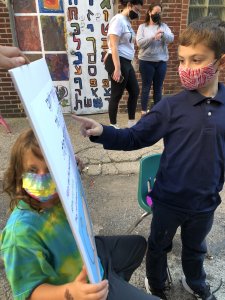
On Tuesday, we considered our connections to something bigger. After reading You are Stardust, kids felt especially excited about the idea of being connected to larger scientific/ geological/astrophysical phenomena. For many people, something bigger meant a house, or a giant statue or science, but we also tried to connect how larger physical objects might connect to other “something bigger” ideas that can’t be seen (like the Statue of Liberty to the idea of liberty.)
Then on Wednesday, we considered an impressive range of potential acts of lovingkindness, including:
- Different kinds of volunteering
- Picking up trash
- Keeping people company
- Showing affection
- Doing extra chores
- Tzedakah
- Being patient
- Protests
- Leaving good tips
- Inventing helpful things
We also considered who in our community might need a little extra lovingkindness right now, and kids came up with names like:
- Doctors
- Sanitation Workers
- Our cat
- Joe Biden
Nitzanim (3rd, 4th, and 5th graders) kicked off this week with a discussion about Torah and how it’s passed down through generations, since it was received by Moshe on Har Sinai. Nitzanim reflected on how our own commentary contributes to Torah and some memorable stories from the Torah. We also had a tefilah full of movement and song after getting a start with mapping out our mural on Ionic street! We can’t wait to get paint on the wall and see our ideas come to life.
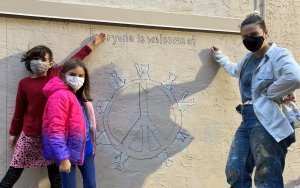
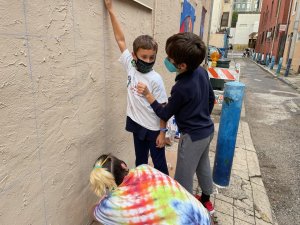
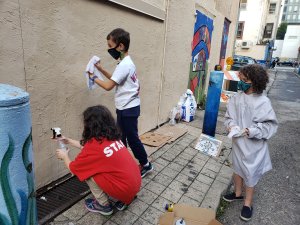
On Wednesday, we discussed one of the other three things the world stands on, according to Shimon Hatzadik: gimilut chasadim, or acts of loving kindness. Nitzanim used whiteboards to draw examples of acts of loving kindness with each other, and then examples of acts of loving kindness we can do for ourselves.
How we practice gemilut chasadim with others:
- Offering mac n’ cheese to a friend
- Being there for our siblings when they’re scared of the dark
- Holding doors for strangers
How we practice gimilut chasadim with ourselves:
- Drawing (specifically aliens)
- Playing video games like tetris
- Going up to our room when we feel sad and angry for alone time
- Making new friends and expanding our support system
We have a few more weeks of our Love Your Neighbor Unit! We are interested to see what bits have stuck with our learners in the upcoming weeks and what questions they might still have.
